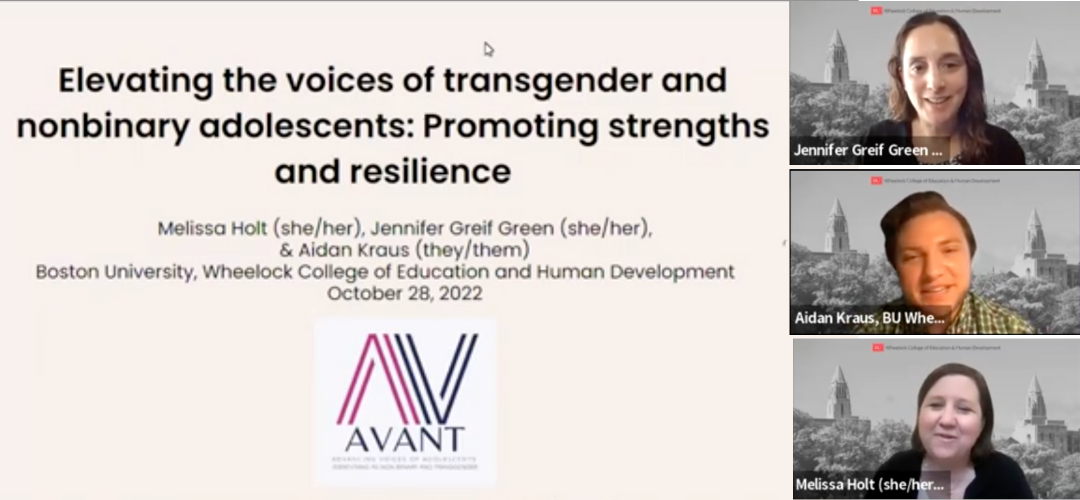Promoting Strength and Resilience among Transgender and Nonbinary Adolescents

Promoting Strength and Resilience among Transgender and Nonbinary Adolescents
In a webinar on October 28, “Elevating the Voices of Transgender and Nonbinary Adolescents: Promoting Strength and Resilience,” BU Wheelock faculty members Melissa Holt and Jennifer Greif Green and doctoral student Aidan Kraus shared their findings from a study of how transgender and nonbinary youth can remain strong and resilient in the face of systemic discrimination. Led by Holt, Green, Kraus, and a team of researchers at Boston University, Boston Children’s Hospital, and Harvard Medical School, Project AVANT (Advancing the Voices of Adolescents Identifying as Nonbinary or Transgender) is the first national longitudinal study of transgender and nonbinary adolescents.
Data for the study were collected from December 2020 to February 2021. Green, an associate professor of special education, says that the study is novel for the following reasons: youth were invited to participate via social media; the survey was longitudinal rather than cross-sectional; and the study focuses on the health, well-being, and school experiences of trans and nonbinary youth. Holt is BU Wheelock’s associate dean for faculty affairs and an associate professor in counseling psychology, and Kraus is a second-year doctoral student. Watch the webinar now.
Highlights from the Webinar
Health Disparities among Trans and Nonbinary Youth
The webinar began with an overview of the health disparities that trans and nonbinary youth face.
“We know that gender-diverse youth experience health disparities. In regard to mental health, research has shown that rates of depression, suicidal ideation, and suicide attempts are higher than among cisgender adolescents. . . . A national survey that came out in 2022 said that transgender and nonbinary youth were 2 to 2.5 times more likely to experience depressive symptoms, seriously consider suicide, and attempt suicide compared to their cisgender queer counterparts.”
–Aidan Kraus
While trans and nonbinary youth are also more likely to struggle with drugs and alcohol than their peers, they can draw on sources of support to promote their resilience.
“School connectedness; nondiscrimination policies at school and state levels; relational support, including family support; and Gay-Straight Alliance school groups have been shown to be forms of protective factors for this community of young people. . . . However, the research has focused on a deficit perspective as opposed to a strengths perspective.”
–Aidan Kraus
Key Findings of the Project AVANT Study
Of the health disparities that the researchers found, they say the results are consistent with other findings in school-based and clinical samples.
“Among participants overall, 58% reported depression, 57% indicated nonsuicidal self-injury behaviors, 46% were classified as having probable PTSD, and 77% reported anxiety symptoms. . . In terms of substance use in the past 30 days, 30% stated they used alcohol, and 20% indicated they vaped.”
–Melissa Holt
But transgender and gender-diverse youth are not defined solely by the hardships they face. The Project AVANT study identified four protective factors that promote resilience in these youth: social transitioning, social support, support from communities, and school context.
“Students who transition socially by “[changing] their gender expression, pronouns, and name to align with their gender identity report fewer mental health symptoms than gender-diverse youth who have not socially transitioned.”
– Melissa Holt